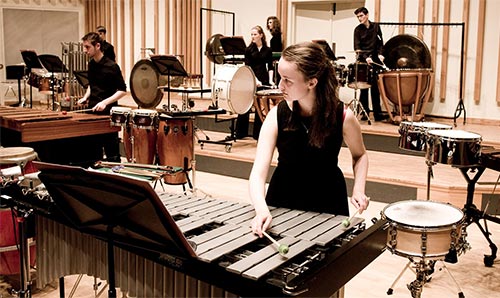
Composition
Composition is not a class. Composition is a culture.
Composition is a fundamental part of our musical culture at Manchester. With six world-renowned professional composers on our full-time staff we are able to cover an exceptionally diverse range of compositional approaches.
At undergraduate and postgraduate levels, our curriculum embraces everything from all forms of concert hall composition and film music composition to electroacoustic composition, interactive and multi-media work, and game audio.
We aim to provide the expertise, the facilities, the culture and the environment to help you find out what type of composer you want to be and then to put that into practice.

Such a number, range and calibre of performance opportunities is unheard of in a university environment.
Tom Coult (MusB 2010, MusM 2011) / Faber composer
The way our composition culture ties in so naturally with our near-conservatoire standards of performance enables us to approach the teaching of composition as a practice-based, rather than a theory-based, subject.
Whilst our reputation for academic excellence in musicology, music theory and analysis guarantees that technique is taught to a very high standard, the emphasis in composition is on learning through doing.
Our thriving performance culture, and the enthusiasm for new music amongst our student performers, enables us to guarantee that everything you compose as part of the MusB will be performed and professionally recorded.
Our award-winning NOVARS studio complex is among the finest of its kind in the world. Its specialisms include electroacoustic composition, spatialisation and sound diffusion, sound art and game audio.
Cutting-edge innovation and unconventional thinking

Manchester is the original modern city: the birthplace of the Industrial Revolution, the place where Rutherford split the atom, Kilburn built the world's first computer and Marx and Engels wrote the Communist Manifesto.
In music, too, Manchester has a long history of unconventional thinking and cutting-edge innovation: from the formation of the Hallé Orchestra in the 19th century, to the New Manchester Group (composers Peter Maxwell Davies, Harrison Birtwistle and Alexander Goehr) in the 1950s, right up to the present day. For composers, the environment in Manchester is electric.
Many young composers choose Manchester simply because of the professional opportunities offered by the city itself. Learning your compositional craft is one thing – and Manchester can certainly help you with that. But launching your career is something else. And that’s all about where you are.
In terms of the opportunities to hear new music live, and to network, Manchester is surpassed by no other UK city outside of London. At the same time, it has the advantage of far greater intimacy with a range of professional venues and facilities within easy walking distance of the Music Department.
Manchester is home to three professional orchestras (the BBC Philharmonic, Hallé and Manchester Camerata), the RNCM and the Bridgewater Hall. MediaCityUK, which includes the central headquarters of the BBC, is just a short tram ride away on Salford's newly regenerated waterfront.

The course's focus on engaging students with aspects of the composition world outside the department has been important for establishing connections and learning how to communicate and network with ensembles, venues, and organisations.
Elizabeth Ditmanson / MusM Composition, Instrumental and Vocal
Our student composers have the opportunity to write for a vast range of student ensembles – from symphony orchestra and chamber orchestra, to big band and brass band, to choral ensembles and opera, to wind orchestra, and to the 60-speaker MANTIS sound diffusion system.
If you have an idea for a combination of instruments that has never existed before, there's a good chance we can make that happen. For more information on our ensembles, take a look at the Manchester University Music Society (MUMS) website.
We have an internationally renowned ensemble-in-residence, the Quatuor Danel. Alongside the range of cutting-edge contemporary music performances they bring to the University in collaboration with performance and composition staff, this highly acclaimed ensemble provides excellent professional opportunities when performing and workshopping student compositions, and sharing the stage with student performers.
In addition, we enjoy well-established working relations with a range of other contemporary music ensembles and artists, including Trio Atem, Vonnegut Collective and Distractfold. Our professional Walter Carroll Lunchtime Concert Series also boasts a strong contemporary music presence.
If new music is what you want to hear, come to Manchester. If new music is where you want to be, come to Manchester.
